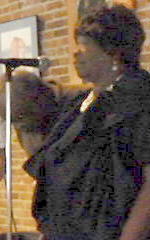 Craig Howley, Jerry Johnson, Jennifer Petrie wrote 1 February 2011,
Consolidation of Schools and Districts: What the Research Says and What it Means:
Craig Howley, Jerry Johnson, Jennifer Petrie wrote 1 February 2011,
Consolidation of Schools and Districts: What the Research Says and What it Means:
…the review of research evidence detailed in this brief suggests that a century of consolidation has already produced most of the efficiencies obtainable. Research also suggests that impoverished regions in particular often benefit from smaller schools and districts, and they can suffer irreversible damage if consolidation occurs.Isn’t such irreversible damage what Rev. Floyd Rose got Mrs. Ruth Council to admit?
They are referring to black schools before desegregation in the 1960s.Rev. Rose: “…we were told about the world, where we came from, how we got here.”


Mrs. Council: “I think we did receive a better education.”
Rev. Floyd Rose is president of the local SCLC, and here is a statement by Leigh Touchton, president of the local NAACP: Continue reading





